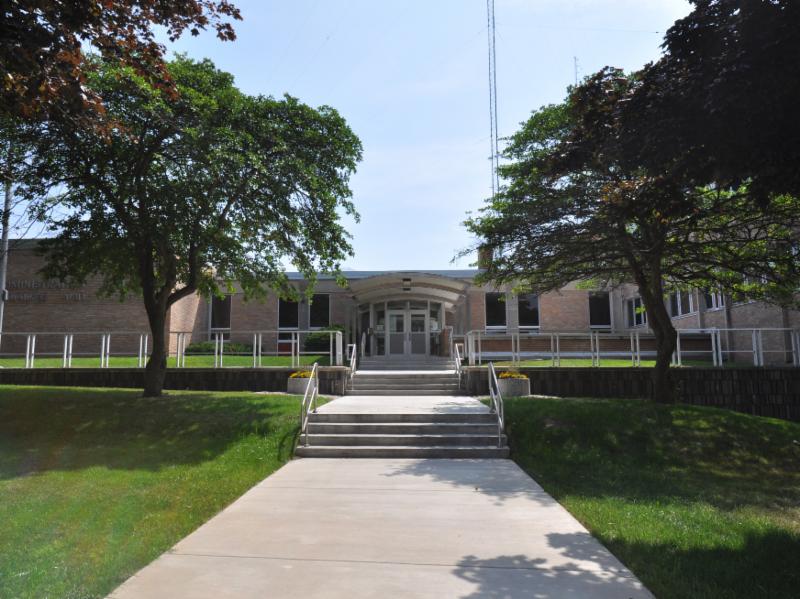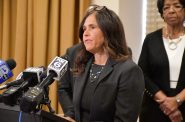How Will School Board Hire New Superintendent?
What's the likely process and how were past decisions made?

Milwaukee Public Schools Office of School Administration, 5225 W. Vliet St. Photo courtesy of Milwaukee Public Schools.
With the resignation of Milwaukee Public Schools superintendent Keith Posley, MPS faces a big issue: finding a new leader. While some have pushed for another elected official appoint the new superintendent, state law gives that authority only to the school board. Mayor Cavalier Johnson says he doesn’t want to run the district — an idea that’s been pushed in the past — but he wants to be involved in the hiring process. And with the Wisconsin Department of Public Instructions (DPI) withholding funds from the district, MPS is not in a strong position to resist involvement from state or local officials.
Jilly Gokalgandhi, vice president, of the Milwaukee School Board, has stated that the board will conduct a “national search” for a superintendent. No present school board member has ever hired a superintendent. Urban Milwaukee interviewed Larry Miller, a former board member involved in the last three superintendent searches, and Ben Niehaus of the Wisconsin Association of School Boards (WASB) as to how the search might be conducted.
When Milwaukee superintendent William Andrekopoulos announced that he would retire at the end of the 2010 school year, the board had time to hire a new superintendent. That was not the case when Gregory Thornton left in 2014 and Darienne Driver in 2018. In both case interim superintendents were hired, prior to hiring both Driver and Posley. Another interim superintendent is likely to begin the next school year for MPS.
The search for a permanent superintendent is likely to start with a search organization. In 2010, the MPS board contracted with Ray and Associates, a national search firm. WASB has a Wisconsin search structure usually used for smaller Wisconsin districts. However, Niehaus says that the WASB search is part of a national organization and can bring in national candidates.
WASB posts openings, but will not do “headhunting,” going after possible candidates from other Wisconsin districts who have not applied. Ray and Associates, like many such consultants, will go after candidates, but will not steal from a district if Ray was involved in both school districts.
Recruiting quality candidates is an issue. Running a big-city school system is not an easy job. Niehaus remembers attending a conference where a district with 80+ buildings once would get 100-150 applicants. Last year they got twenty-five.
Once a search team is selected, the board establishes a search calendar. Niehaus says districts begin in December or January if they know a vacancy is coming. The longer a district waits, the harder it is to get a new superintendent. That is why districts with late openings are more likely to go with an interim superintendent for the following school year.
Next the board has to decide what it wants in a superintendent. A search team might supply a check list or a list of possible considerations. Ray was more structured while Niehaus says WASB is more conversational. Then a posting is sent out.
WASB will take the responses and present them to the board. Ray added names of possible candidates who did not apply but should be contacted. Some boards want to see the entire list; others districts may want the list weeded out to include what look like the top dozen candidates, says Niehaus.
The board may narrow the list to possibly five or six candidates it wants to interview. After the first interview, possibly three are selected for a second interview.
In 2010, the MPS board created several panels of citizens, organizations and governmental officials to interview the finalists. Then-Mayor Tom Barrett asked to privately interview the finalists. The previous year, Barrett and Gov. Jim Doyle tried and failed to pass legislation establishing mayoral control of the district. The MPS board told the mayor he could be part of a panel, but no private interviews. Barrett sent a representative. Since Mayor Johnson has stated he is not interested in a takeover and would like to work with the district, his request to interview candidates might be more acceptable to board members.
In 2010, the three candidates gave presentations in the central auditorium for the public. This time around, Miller urges a similar process be used: “There must be a transparent interchange. The process has to be pretty stellar. There will be a lot of attacks and disruptions if they don’t do it right.”
Letters of recommendations have to be confirmed. Background checks have to be done. “If you rush through it, and you don’t get the right candidate, or you miss something, your big problem has just been compounded, and now you are looking for someone four months later because you missed something,” says Niehaus.
Lessons were learned from hiring of Thornton in 2010. Thornton was recruited by Ray and was considered a “reluctant” applicant. After just a few years in Milwaukee, says Miller, “someone leaked it to us that Thornton was applying to a large district outside of Washington.” That was in 2014, and Ray told the Milwaukee School that it had not recruited Thornton for the job which turned out to be for superintendent of the Baltimore schools. Thornton applied on his own. Baltimore is less than two hours from Thornton’s hometown of Philadelphia.
Driver was then the chief innovation officer for MPS and was promoted to interim superintendent and then given the full time job. “We were pleased with her because she could talk to people,” says Miller. But she left Milwaukee in 2018. She had clashed with the board for giving raises to administrators without the board’s authorization. However, she was also engaged to be married in Detroit and took a position there. She had lived in Milwaukee for only few years, brought here by Thornton from Atlanta for the innovation officer job. She began her teaching career in Detroit.
Posley, a longtime district educator, had been a physical education teacher, a principal, and the district’s chief of school administrationbefore he was hired as interim superintendent. He quickly won the support of the board by cutting some of the central administration positions Driver had created and placing more teachers in the classroom. Moreover, the loss of two candidates from outside Wisconsin in a row after just a few years on the job left board members feeling a local candidate might be a wiser pick. That helped Posley win the job of permanent superintendent.
Now the school board has a choice. It can bring in a dynamic outsider knowing that MPS may be only a stepping stone to another position; such turnover is common. Or it can bring in someone with Milwaukee roots who might give the district stability for a longer period of time, as the hope was for Posley. The promised national search suggests the board may go for an outsider candidate.
Disclosure: Terry Falk served as school board member when the last three superintendents were chosen.
If you think stories like this are important, become a member of Urban Milwaukee and help support real, independent journalism. Plus you get some cool added benefits.
More about the MPS Financial Crisis
- New MPS Superintendent Left Prior Job During Period It Faced Similar Criticism - Corrinne Hess - Feb 14th, 2025
- MPS Audit Finds ‘Culture of Fear and Reluctance to Change’ - Jeramey Jannene - Feb 13th, 2025
- K-12 Education: Meet the New MPS Superintendent - Terry Falk - Feb 11th, 2025
- MPS Still Owes Financial Data To State - Corrinne Hess - Oct 15th, 2024
- K-12 Education: MPS Consultant Will Guide Decisions - Terry Falk - Oct 9th, 2024
- K-12 Education: Aycha Sawa Faces New Challenges as MPS Financial Officer - Terry Falk - Sep 24th, 2024
- Milwaukee School Board Recall Fails - Graham Kilmer - Aug 19th, 2024
- Gov. Evers Announces MGT Consulting of America Selected to Conduct Independent Audit of MPS Operations - Gov. Tony Evers - Jul 29th, 2024
- MTEA Files Ethics Complaint Against Secretive “Recall Collaborative” After Recall Organizers Admit to “Anonymous Donors” - Milwaukee Teachers’ Education Association - Jul 26th, 2024
- Milwaukee Board of School Directors Statement Regarding an Interim Superintendent of Schools - Milwaukee Public Schools - Jul 25th, 2024
Read more about MPS Financial Crisis here
K-12 Education
-
MPS Training in Science of Reading Going Poorly
 Nov 23rd, 2025 by Terry Falk
Nov 23rd, 2025 by Terry Falk
-
The Fear Factor at MPS
 Nov 11th, 2025 by Terry Falk
Nov 11th, 2025 by Terry Falk
-
MPS Reaching Out to Community
 Nov 2nd, 2025 by Terry Falk
Nov 2nd, 2025 by Terry Falk


















